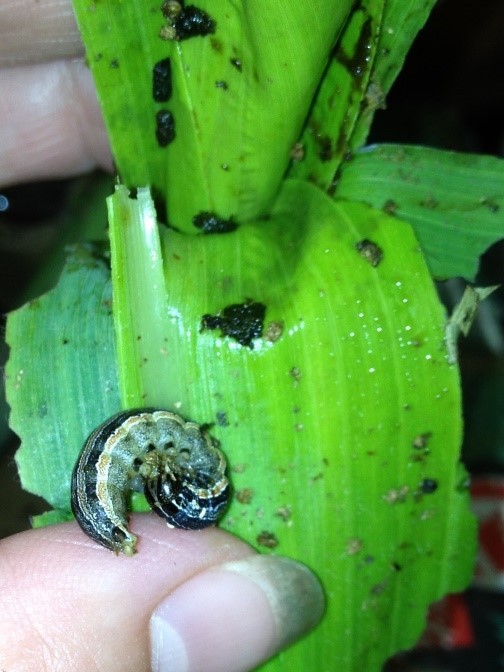True Armyworms Invading Sweet Corn!
Chuck Bornt, Team Leader, Extension Vegetable Specialist
Eastern New York Commercial Horticulture
This article was published in the June 7th 2018, ENYCHP Vegetable News. Click here to view the full newsletter.
The last two weeks have had us finding some True Armyworm adult moths in our traps. These moths move up from southern overwintering sites on storm fronts. If you recall, we've had some issues with these buggers in the past and sweet corn isn't their only host as we've seen them attack several vegetable crops including sweet corn, brassicas, tomatoes, peppers and greens. Not only is their damage a problem, but on things like lettuce, the droppings can affect marketability of the crop.
Armyworms, whether Fall or True, are very eager feeders and can do a lot of damage in a short time. Their feeding damage tends to appear ragged, with large holes eaten in the leaves and they leave lots and lots of sawdust looking frass (insect terminology for fecal matter). They tend to feed on the top sides of crops during the night and on the undersides or deeper into the plant during the day.
The adults are fairly large moths which are primarily nocturnal and have the ability to lay up to 2,000 eggs in their two week life. The eggs will hatch in 7 to 14 days and the larvae begin feeding immediately, going through seven stages of development over several weeks. The worms tend to be greenish brown (with some variations) with a pale white stripe on its back and an orange stripe on each side of the body. One other distinguishable feature is a dark brown to black triangle located on the outside of each of the four pairs of prologs found towards the hind end of the body.
Thresholds for when to treat corn have been established and should be treated when 25>#/b### of the plants are showing damage (Source: Integrated Pest Management Program, Missouri University). For sweet corn and leafy greens, best control is achieved when the larvae are small (1st and 2nd instar) and applied usually later in the evening when the larvae tend to be more active and feeding on the upper surfaces of the plants.
There are a number of insecticides labeled for leafy greens including these organic products: Pyganic (pyrethrin), Dipel (Bacillus thuringinensis, subsp. Kurstaki), Xentari ((Bacillus thuringiensis, var. aizawai), Aza-Direct (azadirachtin), Azera (pre-mix of azadirachtin and a pyrethroid) and Entrust (check the label for the labeled rates as formulations vary for these products). Again, these products are going to work best when applied to small larvae but if they get ahead of you, tank mixing a pyrethroid (Aza-Direct, Pyganic etc.) with a Bt (Dipel, Xentari etc) will improve performance. Repeat applications may also be necessary depending on how long the egg laying period and development conditions are.
Conventional insecticides labeled for armyworm control on sweet corn and leafy greens including Warrior II, Baythroid (both are recommended for 1st and 2nd instars), Coragen and Lannate. Ensure that you get thorough coverage, of the canopy with any of these products including the whorl in the case of sweet corn. Late evening applications also keep insecticides wet longer ensuring larval contact and ingestion of the insecticides. Other insecticides labeled for sweet corn include Asana XL (1st and 2nd instars), Mustang Max, Radiant SC and Blackhawk. Please check labels for rates.
 Note the ragged feeding and dark colored frass. (Photo: Teresa Rusinek)
Note the ragged feeding and dark colored frass. (Photo: Teresa Rusinek)
Upcoming Events
2026 Northeast Extension Fruit Consortium Winter Webinar Series
February 4, 2026 : Management of Up and Coming Strawberry Diseases in the Northeastern United States
Session 1: Management of Up and Coming Strawberry Diseases in the Northeastern United States
February 11, 2026 : Kiwiberry Production in the Northeast
Session 2: Kiwiberry Production in the Northeast
February 18, 2026 : Heat Mitigation- Sunburn and Fruit Coloring
Session 3: Heat Mitigation- Sunburn and Fruit Coloring
February 25, 2026 : The Dating Game- Updates in Lepidopteran Mating Disruption
Session 4: The Dating Game- Updates in Lepidopteran Mating Disruption
March 4, 2026 : USEPA Endangered Species Act Strategies and Pesticide Use
Session 5: USEPA Endangered Species Act Strategies and Pesticide Use
March 11, 2026 : Practical Drought Management for Fruit Growers
Session 6: Practical Drought Management for Fruit Growers
Managing the Invasive Swede Midge Webinar
March 6, 2026 : Managing the Invasive Swede Midge Webinar
Swede midge is an invasive fly that causes serious economic losses to brassica crops. Due to its small size and hidden feeding habits, swede midge is often called an "invisible pest" and damage may be misdiagnosed. In this webinar, we will review the swede midge life cycle and crop damage symptoms, current management recommendations, new research findings, and highlights from on-farm case studies with a focus on organic management.
New Farm Manager Skills Day - Get the Tools You Need to Grow Your People (Hudson Valley)
March 10, 2026 : New Farm Manager Skills Day - Get the Tools You Need to Grow Your People
Millbrook, NY
Are you moving into a supervisory farm management role this season and want to get off to a good start? Are you an experienced manager who wants to connect with other "people" managers and work on your skills? This one-day workshop is for you!












































